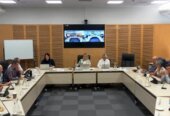
David Waitere, pictured with his daughter Claudine.
A senior kaumatua to the Kīngitanga movement, is lending his mana and own story to the launch the National Bowel Screening programme across Waikato.
The free screening programme is rolling out across the region for men and women aged of 60 to 74.
David Huti Waitere is urging people to whakarongo, kōrero and ako – listen to his story, open up talk about changes in their bowels and learn from his experience 22 years ago.
Mr Waitere was diagnosed with bowel cancer in 1999. He was 55 and working fulltime in the agriculture industry.
He was fit and had no obvious risk factors; he didn’t smoke or drink and wasn’t overweight.
His youngest daughter and now caregiver Claudine Waitere recalls her dad losing a dramatic amount of weight and being constantly tired.
“Dad was a really strong, healthy farmer – he’d be carrying fence posts and cutting down trees and scrub,” she says.
“But he was losing weight and that was hard to see. He should have been about 70 to 80 kilograms, but he was about 62. He got pretty skinny and he’s always been a good eater.”
She says her dad would try and hide some of his symptoms from his wife Bonnie, including the bleeding from his rectum.
It was Bonnie who kept pushing him to go to the doctor.
Mr Waitere says he kept working despite the symptoms “until I had to go to the doctor and the doctor said I needed to stop”.
While he was working, Mr Waitere would also travel to hui most weekends as a servant to late Māori Queen Te Arikinui Dame Te Atairangikaahu, and the current King Tuheitia.
“Those were the things he did with his life despite his illness,” Ms Waitere says.
And it was an illness which was very much kept a secret from the family’s five young children.
“We didn’t realise that he was going through his struggle and he didn’t share much with us either. So families need to talk about this so that we can understand what’s going on,” Ms Waitere says.
Mr Waitere was cured of his cancer following surgery.
“During the pre-surgery consultation it was noted that one of the actions was to ask whether Dad would agree to have a stoma bag inserted. Being a person who didn’t question authority or the mana of the doctor, he gave consent without fully understanding what was being asked. This was a very emotional low point for my sister-in-law who was with Dad at the time.
“Decisions like this should be discussed with the whānau, not just the patient alone. Fortunately, the decision to have a stoma bag did not go ahead,” Ms Waitere says.
“So Dad’s saying ‘whakarongo, kōrero, ako’ serves well in a whanau context as well.
Gastroenterologist and Waikato Bowel Screening Programme clinical lead Dr Liz Phillips says she’s grateful for Mr Waitere’s courage in sharing his story and is thankful he was one of those who survived.
Each year around 3000 Kiwis will be diagnosed with bowel cancer, while more than 1200 will die from it. Bowel cancer, also known as colon, rectal or colorectal cancer, is the second-most common cause of cancer death in New Zealand.
Dr Phillips says the National Bowel Screening Programme saves lives by detecting possible signs of cancer early, meaning it can be cured in a less aggressive way that what Mr Waitere went through.
David Waitere’s story can be viewed at https://vimeo.com/467910658
How the process works:
The Ministry of Health will send out a ‘Fit’ kit in the mail every two years to those in the eligible age range.
If it is your turn to be screened, you will receive an invitation letter, a consent form, and a free bowel screening kit.
The free test is quick, clean and simple to do by yourself at home.
The kit will last six months if the seal is unbroken, giving you time to discuss it with friends, family or your doctor and to complete it in your own time.
Once the seal is broken it should be used as soon as possible because it should arrive at the laboratory for testing within seven days. The kit can be sent in the post using a prepaid protective envelope.
Participants will then be sent a letter with the results of the test. If negative, nothing further needs to be done until it’s time to do the kit again in two years.
If positive, the participant’s GP will be in contact to arrange a free appointment paid for by the Bowel Screening Programme to discuss the results and the next steps.
If you have any of the following symptoms, or you are concerned about your bowel health, see your GP right away:
• Bleeding from the bottom (rectal bleeding)
• Change of bowel motions/habits that come and go over several weeks
• Anaemia
• Severe persistent or periodic abdominal (tummy) pain
• A lump or mass in the abdomen
• Tiredness and loss of weight for no obvious reason
For more information, visit the Time to Screen website, call Time to Screen on 0800 924 432 or talk to your doctor.








